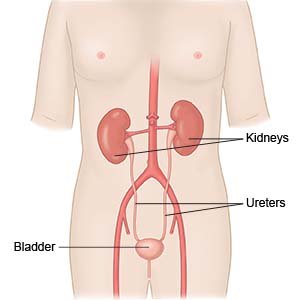Urinary Urgency and Frequency
Medically reviewed by Drugs.com. Last updated on Apr 6, 2025.
What is urinary urgency and frequency?
Urinary urgency and frequency is a condition that increases how strongly or how often you need to urinate. The condition may also be called urgency-frequency syndrome. Urinary urgency means you feel such a strong need to urinate that you have trouble waiting. You may also feel discomfort in your bladder. Urinary frequency means you need to urinate many times during the day. This may also be called increased daytime frequency. You may be woken from sleep by the need to urinate. Urgency and frequency often happen together, but you may only have one.
 |
What causes urinary urgency and frequency?
- A urinary tract injury or infection (UTI), or a chronic bladder infection
- Infection in your urethra, or urine leaking from your urethra
- A nerve problem, or radiation treatment for cancer
- A medical condition, such as bladder cancer, diabetes, or a stroke
- Anxiety
- In women, pregnancy, menopause, or a vaginal infection
- In men, prostate infections, swelling, or enlargement
How are urination problems diagnosed?
Your healthcare provider will ask questions about your symptoms. The provider will check your pelvic area and abdomen for problems that may be causing your symptoms. Tell the provider about any medical conditions you have and the medicines you take. You may need any of the following:
- Blood and urine tests may be done to look for signs of infection, or blood in your urine. Your blood glucose (sugar) level may also be tested.
- An ultrasound may be used to measure the amount of urine in your bladder after you urinate.
- A cystoscopy may show problems inside your bladder. The cystoscope is a long tube with a lens and a light on the end.
- Urodynamic testing may show how well your bladder works.
How is urinary urgency and frequency treated?
Treatment will depend on the type and cause of your urination problems. You may need any of the following:
- Medicines may be given to relax your bladder and decrease urination. You may also need antibiotics if your symptoms are caused by a bacterial infection.
- Sacral nerve stimulation sends electrical signals to your sacral nerve through a small device implanted under your skin. Your sacral nerve controls your bladder, sphincter, and pelvic floor muscles.
- Botox injections into your bladder may help relax your bladder muscle to decrease urgency and frequency.
- Surgery may be done if all other treatments cannot help you control your bladder.
What can I do to manage urinary urgency and frequency?
- Keep a record of your urination patterns for a few days. Write down the number of times you urinate over 24 hours, the amount, and if you have urine leakage. Record how strong the urge to urinate was each time. Your healthcare provider may also want you to record the type and amount of liquids you drink.
- Train your bladder. Go to the bathroom at set times, such as every 2 hours, even if you do not feel the urge to go. You can also try to hold your urine when you feel the urge to go. For example, hold your urine for 5 minutes when you feel the urge to go. As that becomes easier, hold your urine for 10 minutes. Work up to every 3 or 4 hours to help control your bladder.
- Limit liquids as directed. Limit liquids to decrease the amount you urinate. Ask how much liquid to drink each day and which liquids are best for you. You may need to avoid drinking liquids several hours before you go to sleep. Your healthcare provider may also recommend that you limit caffeine and alcohol.
- Do Kegel exercises often. Kegel exercises help strengthen your pelvic muscles and improve bladder control. These muscles help you stop urinating. Squeeze these muscles tightly for 5 seconds like you are trying to stop the flow of urine. Then relax for 5 seconds. Gradually work up to squeezing for 10 seconds. Do 3 sets of 15 repetitions a day, or as directed.
- Exercise regularly and maintain a healthy weight. Ask your healthcare provider how much you should weigh and about the best exercise plan for you. Extra weight puts pressure on your bladder and may make your symptoms worse. Ask your provider to help you create a safe weight loss plan if you are overweight.
When should I contact my healthcare provider?
- Your urine is pink, or you notice blood in your urine.
- You have pain with urination.
- You continue to have symptoms even after you take your medicine.
- You have new or worsening symptoms.
- You have questions or concerns about your condition or care.
Care Agreement
You have the right to help plan your care. Learn about your health condition and how it may be treated. Discuss treatment options with your healthcare providers to decide what care you want to receive. You always have the right to refuse treatment. The above information is an educational aid only. It is not intended as medical advice for individual conditions or treatments. Talk to your doctor, nurse or pharmacist before following any medical regimen to see if it is safe and effective for you.© Copyright Merative 2025 Information is for End User's use only and may not be sold, redistributed or otherwise used for commercial purposes.
Further information
Always consult your healthcare provider to ensure the information displayed on this page applies to your personal circumstances.
